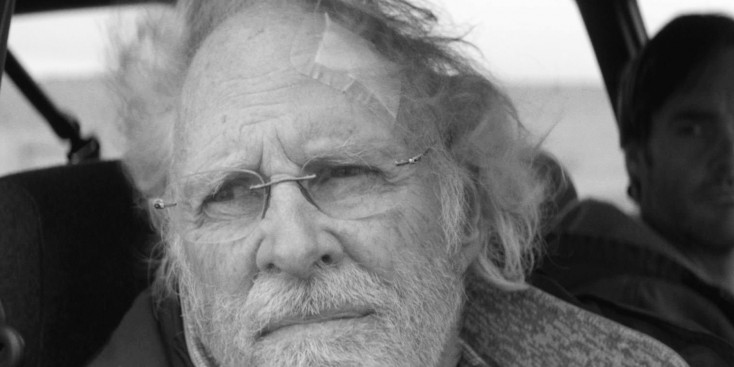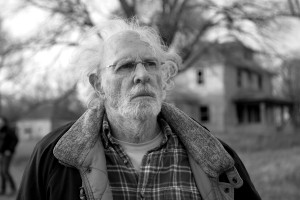By ANGELA DAWSON
Front Row Features
HOLLYWOOD—Bruce Dern has been a workhorse character actor throughout his career, which has spanned five decades and more than 80 films as well as dozens of guest starring roles on TV. He’s primarily known for playing offbeat characters, heroic and villainous, and he has a reputation as being one of the most talented as well as prolific actors of his generation.
Trained by famed filmmaker Elia Kazan at the Actor’s Studio, Dern made his film debut in Kazan’s “Wild River” in 1960. Early in his career, he also found success as a TV actor, appearing in several classic Western TV series, including “Gunsmoke,” “Bonanza” and “Rawhide.”
Dern’s roots, however, are deep in America’s heartland. Born in Chicago, he grew up 20 miles north of the Windy City in the small town of Winnetka, Ill.
“We had to walk a long way to see country folks,” he quips during a recent interview.
Make no mistake, though. Dern is no country bumpkin. His father was a respected attorney and local civil servant. His grandfather served as Utah’s governor and later Secretary of War under Franklin Delano Roosevelt, until his death in 1936 (the same year Dern was born). With that high-level political connection, it’s no surprise that his godmother was Eleanor Roosevelt and his godfather was one-time presidential hopeful Adlai Stevenson.
Dern’s calling was the performing arts not politics, though.
During the 1960s, he worked with director Roger Corman, appearing in several of his classic and defining films including “Wild Angels.” Dern received critical success for his performances in “They Shoot Horses, Don’t They” and “Drive, He Said.” He has the distinction of being the first man to kill John Wayne onscreen with his role as Long Hair in “The Cowboys.”
With his gravelly voice and intense blue eyes, Dern has intermittently received recognition for his work, including an Oscar nomination for his memorable supporting performance as a returning officer with PTSD in the 1978 Vietnam War drama “Coming Home.” (He lost to Christopher Walken, who starred in that year’s other acclaimed war drama “The Deer Hunter.”)
The talk around Hollywood is that Dern may be heading back to the Oscars ceremony next year, thanks to his memorable performance in Alexander Payne’s dramedy, “Nebraska.” In it, he plays Woody, an aging alcoholic, who believes he has won a sweepstakes contest that he received in the mail. Though everyone he knows tries to explain to him that it’s merely a ploy to sell magazines, Woody sets off on a 750-mile journey from Billings, Mont. to the sweepstakes company’s headquarters in Lincoln, Neb. to claim his prize. Accompanying him as his driver on the trip is his reluctant but loving son, David (“Saturday Night Live’s” Will Forte, in a dramatic departure), who seems to be the only person in the family concerned about Woody’s feelings.
The 77-year-old won the top male actor prize earlier this year for his comical and heartwarming turn at the Cannes Film Festival. He also is slated to receive a career award from the Palm Springs International Film Festival in January. In 2010, he and his ex-wife, actress Diane Ladd, and their daughter, Laura Dern, also an actress, received their stars on the Hollywood Walk of Fame on the same day.
Dern recently spoke about starring in the newest film by Payne, who also helmed the quirky “Election,” “Sideways” and the George Clooney-starrer “The Descendants,” which won four Oscars in 2011 including Best Picture and Best Director.
The actor makes no bones about his desire to make another trip to the Oscars after 35 years.
“It would mean everything,” he says. “When I won in Cannes I was stunned. I didn’t know about it until a day later because I already had left town. But the right guy, Alexander (Payne), picked up the trophy for me.”
Dern says well-written, fully-fledged characters like Woody are hard to come by, so he was pleased as punch that Payne cast him in the role. Having grown up in the Midwest, he feels he could relate to, and even identify some of the film’s oddball characters from his own family, friends and acquaintances.
Co-star Forte says Dern made him feel welcome on set.
“He was just wonderful to me,” the comedian says. “He was just very patient and treated me as somebody who had a bunch of formal training and like I was just part of the gang.”
The film, which was penned by first-time screenwriter Bob Nelson, stars Bob Odenkirk (“Breaking Bad”), June Squibb (“About Schmidt”) and Stacy Keach, as Woody’s rude nemesis Ross Grant, who leads an effort to make fun of Woody when he stops by his Nebraska hometown on the way to his destination. Payne chose to shoot it in black-and-white, giving it a timeless quality, although it is set present-day.
Q: What do you remember about living in the Midwest as a child?
Dern: Whenever we’d drive west in the car, we’d have a contest to see who would see the mountains first. Before you can get to that, you’ve got to go to Nebraska, because once you leave Grand Island, it’s the first time you get a hint of those mountains out there. So there was a stoic-ness about the trip and excitement about it because a lot of my people were from Utah. We always got stoked about that. Once we got past central Iowa, the people were monumental to me. They were bigger than life, not in size, although they were bigger size-wise too, because the kids are hauling ice or shucking wheat or whatever it is that they do. There was an honesty and integrity, even at the gas station. So I always felt that once I left Illinois, everyone was fairer than where I lived. That was the quality I picked up on more than anything else in the script. There’s just kind of a fair-honesty about everything.
Q: What did you make of your character in the movie?
Dern: If there’s one ingredient that Woody has—and I don’t know if he knows he has it—he’s a fair man and he believes everybody else is going to be fair. And when they’re not, there comes the story.
Q: How do you feel about the movie being in black and white?
Dern: All my life, but particularly from the ages 0 to 20, my whole feeling about the entire Midwest is that it’s all black and white. If you went into Chicago 20 miles north, it was in color. It’s not because I discovered it in newsreels or anything else, but because of the texture of the people. There is an honest sense you get once you get away form the big cities, and black and white picks that ups— the nobility, honesty, forthrightness and fairness. It’s all there in black and white. There’s not a thing in “Nebraska,” that isn’t part of what’s in my heart and where I grew up.
Q: What drew you to the screenplay?
Dern: The wonderful thing about Bob and Alexander’s material is that it works on the page. You could get robots to do this and it will work. The excitement of it is you have a director who is standing right next you, and you can feel his pulse. He knows the scripts works. Eighty percent of his job, he feels, is accomplished in his casting. So we all knew he felt we were the person (we were playing). He’d sit there watching the movie. He’s the first one seeing it. And if it’s not quite what he wants to see, he pokes you a little and says, “Two” or “Take 2,” meaning, “Do it again.” He’s like the guy in the huddle with you, calling the plays, and then he’s going to sit back and see if you run them well. It’s an experience I’ve never had before in my career, and I’ve worked with plenty of people who have major game as directors. I’d never been in a piece of material where it was all there to begin with. We didn’t have to add anything, and I’m Mr. Add, trust me. I’m the guy who puts in anything I can to make Brucy look a little better. (He chuckles.)
Q: Do you have favorite scenes?
Dern: One of the treats of the movie is to see what my teammates come up with when there’s a crisis in the movie. The choices the actors make, like when Odenkirk says to Will when he’s leaving the hospital room, “Do you want (the door) open or do you want it closed?” That just touches me. Or when Will is lying on the floor of the car after I’ve finished giving Stacy Keach (his comeuppance), and he has that innocently beautiful smile on his face. That stuff breaks my heart. And when June (Squibb) touches my hair and says, “You big idiot!” —it’s the way she does it. That’s the thrill for me of “Nebraska.” Not to start talking about awards season, but we all got awarded when we got cast in this. You do anything you can do to get into an Alexander Payne movie. When I began acting, you did everything you could to get into a (Elia) Kazan movie. He gives actors an opportunity and a setting, which is almost operatic in size, but on a different scale. There are folks out there that are like this and they’re worth a story.
Q: How important is the awards buzz to you?
Dern: The thing I’m proudest of this movie is the group effort, and I include the people behind the camera. Alexander’s got an 85-member crew and half of them have worked on every movie he’s ever made. So he’s got a family there. That’s what made it exciting. It was an at-bat for all of us. I also want to say it was about time they let June Squibb get out there and be Rosaline Russell. Paramount (Vantage) executives had the vision to know this had to be a black and white movie and they had the courage to allow Alexander Payne put his vision on the screen.






